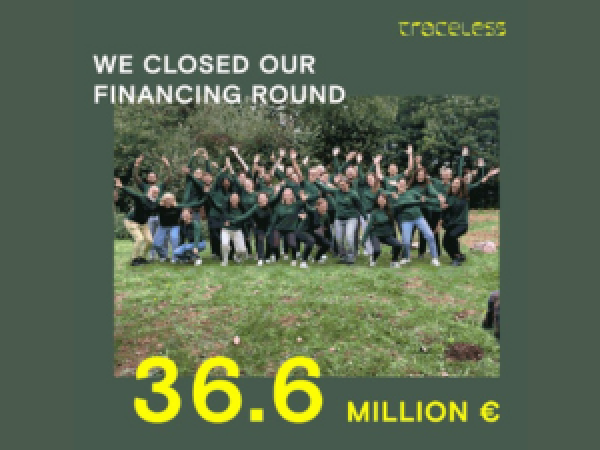The financing round was led by UB FIGG and SWEN CP’s Blue Ocean fund. traceless materials secures the funding to expand the production capabilities for its innovative biomaterial technology to industrial scale.
Bioeconomy startup traceless, which produces a natural biomaterial as an alternative to plastic, announces the completion of a €36.6 million funding round. The Series A funding round is led by private equity fund UB Forest Industry Green Growth Fund ("UB FIGG"), which invests in sustainable and resource-efficient forest and biobased industries, and complemented by SWEN CP’s Blue Ocean fund, which invests in innovations that help address the three existential threats to ocean health: overfishing, pollution, and climate change. A local banking syndicate consisting of GLS Bank, Hamburg, and Hamburger Sparkasse also participated in the financing round, as well as the company's three existing investors, greentech investor Planet A Ventures, seed investor High-Tech Gründerfonds (HTGF), and deep tech investor b.value.
Transforming to a circular economy
Plastics not only leave behind the visible traces of global plastic pollution, but also contribute significantly to the climate crisis through their resource-intensive production from fossil raw materials. As part of a sustainable circular economy, the bioeconomy offers a solution: tracelessmaterials has developed a holistically sustainable material to tackle the plastic crises. The natural biomaterial traceless® is certified completely bio-based, home-compostable, and plastic-free. By using agricultural residues, valuable biomass resources are conserved. The patent-pending technology is based on natural polymers, contains no potentially harmful chemicals, and has a minimal ecological footprint: compared to plastic, 91% of CO2 emissions and 89% of fossil energy requirements are saved during production and disposal.
“Through scaling our innovative technology, we prove that a climate-friendly, circular, resilient and regenerative industry is possible. With our novel biomaterial, we can make a significant contribution to solving plastic pollution.", said Dr. Anne Lamp, CEO and co-founder of traceless. "We are convinced that UB FIGG and SWEN’s Blue Ocean fund are a great addition to our shareholders as they have relevant knowledge in our industry. The fact that both our investors and the banks fully support our mission was a decisive criterion for us."
In order to implement the innovative technology on an industrial scale for the first time, traceless is building a demonstration plant in Hamburg. With this production plant, the company will replace several thousand tons of conventional plastic annually and at the same time save a significant amount of CO2 emissions, fossil resources, water, and agricultural land.
“Financing capital-intensive start-ups is still unfamiliar to many investors and banks. This makes it a special challenge for industrial manufacturing start-ups like us that are developing the innovative technologies of tomorrow. We are very pleased that with UB FIGG, SWEN CP, Planet A, HTGF, b.value our local bank consortium we have found partners who share our vision and have recognized and understood the challenges of financing our hardware scale-up. With their support, we are going to reach our ambitious goals to make our contribution to solve global plastic pollution!”, said Johanna Baare, COO and co-founder of traceless.
The company produces traceless® materials in the form of a granulate that can be further processed using standard technologies in the plastics and packaging industry. Thus, the material can be used in a wide range of end products -from rigid molded parts and flexible films to paper coatings or adhesives.
ABOUT TRACELESS
The bioeconomy start-up traceless materials GmbH was founded in 2020 by Dr. Anne Lamp and Johanna Baare in Hamburg. The mission: to contribute to a regenerative, climate-friendly economy and a future free of plastic pollution. With their innovative technology, the company turns agricultural industry plant leftovers into natural biomaterials that are bio-based, home compostable, plastic-free and have a minimal ecological footprint. To realize the ecological potential, the technology is being scaled up from pilot scale to industrial scale. Traceless received an EIC Phase 2 grant of € 2,425,149.00 in June 2021.

DISCLAIMER: This information is provided in the interest of knowledge sharing and should not be interpreted as the official view of the European Commission, or any other organisation.

